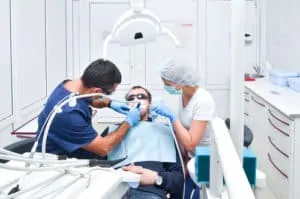Archives

Ice Cream
One of the best parts of getting dental treatment is that you have an excuse to eat ice cream, for every meal if you want to! Ice cream is a great option because not only is it super soft and doesn’t require chewing, it’s also really cold. This coldness can help you get relief if you’re dealing with some soreness and may help reduce swelling.
Yogurt
Another cool, comforting, and easy-to-eat treat that you can have after dental treatment is yogurt. Similarly to ice cream, yogurt doesn’t require you to chew and is also cold. Additionally, many yogurts contain mushed fruits that can give your body healthy nutrients. Just make sure to avoid eating yogurts with crunchy nuts or granola.
Soup
Don’t worry, not every food on this list is in the dairy family. Your dentist in Sparks knows that many patients may be lactose intolerant and will need additional, dairy-free options that are just as easy to eat. Soup is at the top of that list. From different flavored broths to the time-tested comforting chicken noodle, choosing a bowl of your favorite soup can provide your body with nutrients and help you feel full. Keep in mind that if you just had your wisdom teeth out, only eat soups that are warm and not really hot. Hot foods or drinks can slow down the healing process.
Mashed Potatoes
Another favorite go-to snack that’s easy to eat after dental treatment is mashed potatoes. Whether you prefer traditional mashed potatoes or sweet potatoes, as long as they’re cooked and mashed really well, you won’t have a problem eating them. Plus, sweet potatoes, in particular, have anti-inflammatory properties that can be great for oral and overall health.
Fish
Fish like tuna and salmon are not only soft, they’re also packed with healthy fats your body needs, making them an excellent choice for post-dental treatment. You can even pair well-cooked soft fish with some mashed potatoes and have a complete meal!
Following dental treatment, whether dental implant placement, oral surgery, root canal, or filling, you may not feel like eating. But it’s important to keep your body fueled, even if it’s by eating several small meals or snacks a day. Also, don’t forget to drink plenty of water to your mouth and your body hydrated.
If you need dental treatment or are just in need of a dentist in Sparks, give us a call to schedule an appointment. We’re always accepting new patients and are happy to help with anything you may need.

An Important Note About Facemasks
Before we go any farther, we want to be clear that we are not suggesting that you stop wearing a mask, as the potential benefits outweigh the risks. What we are recommending is that you become aware of how your facemask can play a role in your oral health and learn what you can do to help.
Mouth Breathing
While the mask itself isn’t causing cavities, the changes we experience as a result of wearing them can. For example, most of us are not used to wearing a facemask at all let alone daily or perhaps all day every day. Because of this new factor, many people may begin to breathe out of their mouths instead of their noses because it’s more comfortable. However, this change in breathing is what can cause concerns for your dentist in Sparks.
When we breathe out of our mouths, whether because of a facemask or not, it can quickly dry out saliva production and create dry mouth. Dry mouth is concerning because a mouth needs saliva to help wash away things like bacteria and neutralize acids. Without it, teeth are at increased risk for tooth decay and other intraoral problems.
Bad Breath
Besides an increased risk of decay, mouth breathing can also cause bad breath. Since there’s not enough saliva around to wash away bacteria, they’re left free to feed on leftover food particles. As a result, these bacteria release a stinky byproduct.
Avoid Dry Mouth
Now, even though your dentist in Sparks knows that mouth breathing and dry mouth aren’t great for oral health, there are things you can do to help avoid dry mouth or treat it if it does occur such as:
- Drink plenty of water throughout the day. This will help keep the mouth hydrated and moist.
- Suck on sugar-free hard candies or chew gum with Xylitol. Both of these tricks can stimulate saliva production.
- Brush and floss your teeth every day. Maintaining proper oral hygiene can help remove bacteria buildup.
- Talk with your dentist. There are products designed to produce saliva. Your dentist can guide you on what’s the best way to fix your dry mouth.
If you’re concerned that dry mouth may be causing dental problems, or you’d like to talk to someone about getting some relief, call your dentist in Sparks. As with many dental concerns, the sooner dry mouth is diagnosed and treated properly the less chance it has to cause serious, more complicated problems.
